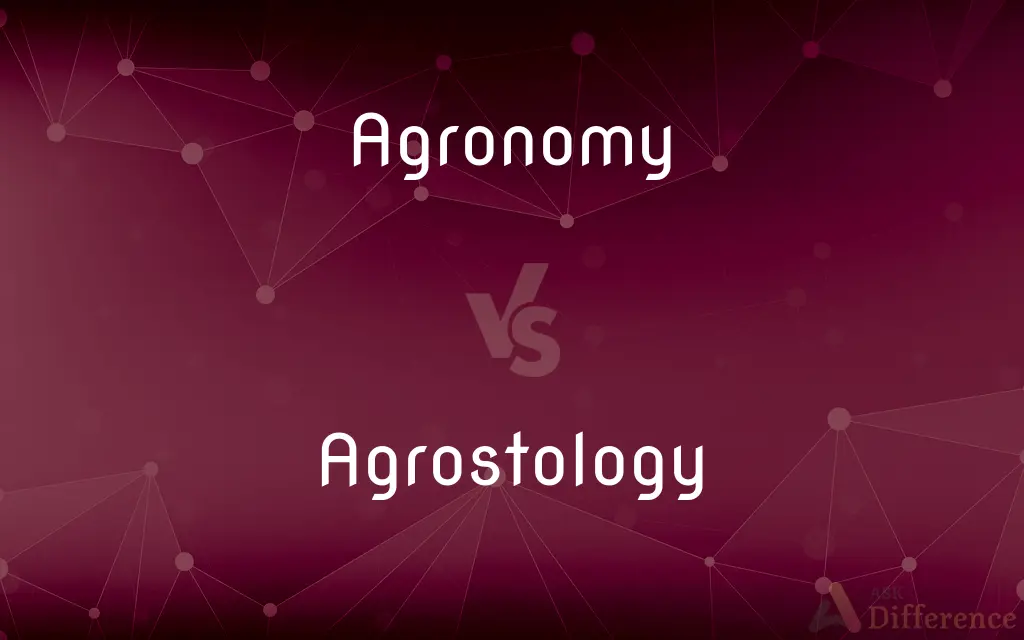Agronomy vs. Agrostology — What's the Difference?
Edited by Tayyaba Rehman — By Fiza Rafique — Updated on April 18, 2024
Agronomy focuses on crop production and soil management; agrostology specifically studies grasses.

Difference Between Agronomy and Agrostology
Table of Contents
ADVERTISEMENT
Key Differences
Agronomy involves the science and technology of producing and using plants for food, fuel, fiber, and land reclamation, while agrostology, a branch of agronomy, zeroes in on the study of grasses, especially in terms of their impact on environments and their uses in agriculture.
In agronomy, research extends to a variety of crops, soil health, and the optimal integration of plant genetics and environmental factors, whereas agrostology specifically studies the taxonomy, biology, and ecology of grass species.
Agronomists develop techniques to improve the growth of crops like wheat, rice, and corn based on their understanding of soil science and plant physiology; on the other hand, agrostologists focus on grasses, which include major cereal crops but also non-crop grasses vital for ecological balance.
While agronomy often aims at enhancing crop yields and sustainability to meet global food demands, agrostology contributes to this goal by deepening understanding of grasses, which are foundational to many agricultural ecosystems.
Agronomy's broader scope includes advising farmers on effective practices across various types of agriculture, while agrostology often involves more specialized advice on pasture and turf management, benefiting ranchers and sports field managers.
ADVERTISEMENT
Comparison Chart
Focus Area
Crop production, soil management
Study of grasses
Research Subjects
Various crops, soil, plant genetics
Grass species, including cereals
Applications
Agriculture, biofuels, reclamation
Pasture management, ecological studies
Objective
Enhance crop yields, sustainability
Understand grass biology, manage grasslands
Typical Professionals
Agronomists
Agrostologists
Compare with Definitions
Agronomy
A field focusing on the ecological and biological factors of crop growth.
Agronomy often requires understanding climate impacts.
Agrostology
The branch of botany that deals with the study of grasses.
Agrostology is essential for managing healthy pastures.
Agronomy
A discipline concerned with producing and using plants efficiently.
Agronomy seeks to balance productivity and environmental health.
Agrostology
A scientific study focusing on grass ecology and biology.
His research in agrostology aids in ecological conservation.
Agronomy
The study of how to increase land productivity sustainably.
Modern agronomy integrates green practices.
Agrostology
The study of the classification and distribution of grass species.
Agrostology helps in identifying new grass varieties.
Agronomy
The application of plant and soil science to crop production.
Agronomy has significantly evolved with technology.
Agrostology
The examination of grasses for their practical uses in agriculture.
Agrostology is vital for improving cereal crop production.
Agronomy
The science of soil management and crop production.
He studied agronomy to improve his farm's output.
Agrostology
The study dedicated to understanding grasslands.
Agrostology contributes to global environmental sustainability efforts.
Agronomy
Agronomy is the science and technology of producing and using plants in agriculture for food, fuel, fiber, recreation, and land restoration. Agronomy has come to encompass work in the areas of plant genetics, plant physiology, meteorology, and soil science.
Agrostology
Agrostology (from Greek ἄγρωστις, agrōstis, "type of grass"; and -λογία, -logia), sometimes graminology, is the scientific study of the grasses (the family Poaceae, or Gramineae). The grasslike species of the sedge family (Cyperaceae), the rush family (Juncaceae), and the bulrush or cattail family (Typhaceae) are often included with the true grasses in the category of graminoid, although strictly speaking these are not included within the study of agrostology.
Agronomy
Application of the various soil and plant sciences to soil management and crop production; scientific agriculture.
Agrostology
The study of grasses.
Agronomy
The science of utilizing plants, animals and soils for food, fuel, feed, and fiber and more. To do this effectively and sustainably, agronomy encompasses work in the areas of plant genetics, plant physiology, meteorology, animal sciences and soil science.
Agrostology
The scientific study of grasses.
Agronomy
The management of land; rural economy; agriculture.
Agrostology
That part of botany which treats of the grasses.
Agronomy
The application of soil and plant sciences to land management and crop production
Common Curiosities
What tools do agronomists use?
Agronomists use tools such as soil sensors, drones for aerial imaging, and crop simulation models to enhance agricultural productivity.
How do agronomy and agrostology differ in their approach to ecosystems?
Agronomy considers broader agricultural ecosystems, including crop rotation and soil health, whereas agrostology focuses specifically on grass ecosystems and their management.
What career opportunities exist in agrostology?
Agrostology careers primarily revolve around research and development, ecological management, and pasture management.
How does agronomy contribute to sustainable agriculture?
Agronomy helps in developing sustainable farming practices that reduce environmental impact, such as integrated pest management and conservation tillage.
What tools do agrostologists use?
Agrostologists often use botanical surveys, genetic analysis tools, and ecological modeling to study grass populations and characteristics.
What role does agronomy play in global food security?
Agronomy plays a critical role in global food security by developing innovative agricultural practices that increase food production efficiently and sustainably.
How does agrostology contribute to biodiversity?
Agrostology studies help maintain and enhance biodiversity through the conservation of grass species and their natural habitats.
What career opportunities exist in agronomy?
Careers in agronomy include agricultural scientists, crop consultants, soil scientists, and farm managers.
What are some common diseases studied in agrostology?
In agrostology, the focus is often on diseases affecting grasses, such as powdery mildew and leaf spot diseases.
How do technological advancements impact agronomy and agrostology?
Technological advancements, such as genetic engineering and precision agriculture, impact both fields by enhancing crop and grass management, leading to more efficient and sustainable practices.
In what way is agrostology crucial for climate change adaptation?
Agrostology plays a key role in climate change adaptation by studying and implementing grassland management strategies that capture carbon and stabilize soil.
What are some common diseases studied in agronomy?
Agronomy covers diseases like rusts, smuts, and blights, which affect a wide range of crops.
How does agrostology interact with other fields of study?
Agrostology interacts with ecology, animal science (particularly in pasture management), and environmental science.
What role does agrostology play in urban planning?
Agrostology contributes to urban planning through the development of urban green spaces that utilize various grass species for recreational and environmental purposes.
How does agronomy interact with other agricultural sciences?
Agronomy interacts with plant genetics, meteorology, and soil science to integrate knowledge and improve crop production systems.
Share Your Discovery

Previous Comparison
Or vs. And
Next Comparison
Hock vs. HorkAuthor Spotlight
Written by
Fiza RafiqueFiza Rafique is a skilled content writer at AskDifference.com, where she meticulously refines and enhances written pieces. Drawing from her vast editorial expertise, Fiza ensures clarity, accuracy, and precision in every article. Passionate about language, she continually seeks to elevate the quality of content for readers worldwide.
Edited by
Tayyaba RehmanTayyaba Rehman is a distinguished writer, currently serving as a primary contributor to askdifference.com. As a researcher in semantics and etymology, Tayyaba's passion for the complexity of languages and their distinctions has found a perfect home on the platform. Tayyaba delves into the intricacies of language, distinguishing between commonly confused words and phrases, thereby providing clarity for readers worldwide.














































